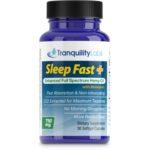You know the saying, “I’ll sleep when I’m dead.” That might just be the case. In fact, a lack of sleep might be pushing you toward an early grave. Neuroscientist Matthew Walker recently held a TED Talk about the implications lack of sleep has on our physiology. Long story short, missing out on sleep hurts almost every aspect of our lives. Dr. Walker told a hushed crowd during his talk that missing out on valuable shut-eye distorts your genes and increases your risk of death. Let’s take a look at some of the shocking outtakes from Dr. Walker’s TED Talk and learn how we can help go to sleep naturally.
How Lack of Sleep is Killing You

Life is fast paced. We are on the go, always connected, and trying to accomplish too many tasks at once. All of these burdens are a drain on the system. That is why it is essential we get solid sleep each night. Sadly, the Centers for Disease Control and Prevention (CDC) reports that one in three adults don’t get enough sleep. This statistic is a cause for concern.
Dr. Walker is also the author of the book, Why We Sleep: Unlocking the Power of Sleep and Dreams. As part of his TED Talk, he delved into the consequences of a sleepless existence. Here are some alarming realizations from the Dr. Walker TED Talk.
Losing Sleeps Hurts Cognitive Function

As Dr. Walker so eloquently put it, sleep deprivation makes you “dumber, more forgetful, (and) unable to learn new things.” The reason a lack of sleep dumbs us down isn’t just because it makes us act sleepy during the daytime. While lethargy is a symptom of sleep deprivation, there’s more to this than meets the eye (or brain).
Our minds use sleep as downtime to solidify our memory banks. It takes the massive amount of information overload we consume each day and filters out the unnecessary. Overnight, your mind reactivates neurons that were created as you learned during the waking hours. During non-REM sleep, your brain creates spines on these neurons, strengthening them for future use.
An analysis on motor memory skills during bouts of sleep deprivation in humans concluded that sleep triggers overnight learning on a motor-sequence memory task, while equivalent waking periods produce no such improvement.”
Sleep Deprivation and Dementia

As Dr. Walker explained, sleeping is not a luxury. He summed up this nighttime ritual as, “Sleep is a nonnegotiable, biological necessity.”
It’s evident that the brain is vulnerable. Our mind needs peace and breaks from Facebook feeds, emails, bills, work duties, unanswered texts, and crying babies. Sometimes we feel like we’re losing our minds, and if we’re losing out on sleep, that might just be the case.
Research indicates that lack of sleep is tied to the onset of dementia. One study looked at what happens to the brain after missing out on just one night of sleep. Test subjects showed that a single sleep-deprived night led to an average increase of 5% beta-amyloid.
Beta-amyloid is a metabolic waste caused by brain neurons. It’s a liquid texture that gets stuck between cells. If it builds up, these wastes create clumps. Studies show that these clumps can lead to the loss of grey matter and the development of Alzheimer’s disease.
Insomnia and Heart Disease

Our minds aren’t the only organ that gets much needed rest when we go to sleep. The most overworked muscle in the body, the heart, also needs a bit of rest. An analysis of more than 470,000 people found that infrequent sleepers have a 48% increased risk of developing cardiovascular disease.
The research further discovered that not getting optimal sleep may lead to an increased risk of developing type 2 diabetes and heart disease.
Another study found that insomnia may lead to calcium deposits in the arteries. This calcification of blood pathways may lead to clogs. As a result, many people who have chronic sleep orders may develop high blood pressure or experience a cardiac episode.
How to Get Sleep Naturally

We know that all the scary information we just gave you is enough to keep you up all night worrying. That’s the last thing we want. Thankfully, Dr. Walker was kind enough to provide some tips during this TED Talk on how to regulate your sleep cycles. We have a couple that we’ve known to work, too. Here are some tips to help you get to sleep naturally.
Kick the Bad Habits

Combining uppers and downers typically end up keeping us up when we should be winding down. According to Dr. Walker, we should cut out caffeine and alcohol. Our bodies have evolved to create our own natural wake-sleep cycles. This phenomenon is known as the circadian rhythm.
A couple of hours before the time we usually go to sleep, our pineal gland will secrete melatonin. This hormone will keep coming until the sun starts to rise. Sun rays will penetrate your eyelids, charging your pineal gland. As a result, your body stops producing melatonin. You naturally wake up. From there, you should rely on water and nutrients from food for your energy, not a stream of caffeine.
If you do opt for caffeine, don’t drink it after lunch. Research shows too much caffeine and caffeine late in the day can disrupt your melatonin production.
While caffeine is known to make you perky, alcohol has a reputation of slowing you down. So, why wouldn’t you want to take a few swigs before counting sheep? Sure, alcohol will knock you out quicker. However, it ruins your REM sleep. You are also more likely to wake up the second half of the night once the alcohol has worn off and all that is left is a dehydrated person with sleep issues.
Break Up the Bad Thoughts

A considerable part of what keeps us up at night is thinking about the fact that we’re up. The first instinct is to dwell on it and stress about how tired you will be in the morning. From there, you go over your agenda and dread all the responsibilities you won’t be able to function through. Before you know it, the sun is up and it’s time to adult again.
Dr. Walker says to break the cycle by getting out of bed. He suggests taking your mind off of things by leaving the room that’s the setting of your insomnia. From there, partake in an activity that will distract the mind from the fact that you can’t sleep.
We recommend that you don’t grab your phone or watch television. There is growing research showing that LED lights in these devices are tricking the pineal gland into thinking the sun is coming up. Grabbing electronics in the dead of night will only make your problems worse.
Instead, try these activities:
- Practice meditation
- Read a book/magazine/newspaper
- Walk around the block
- Do light yoga
- Paint
- Listen to relaxing music, such as jazz
Once you redirect your thoughts, you can re-enter the room with a clean slate. Forget that you ever tried going to bed or that your alarm will go off in three hours. Live in the now and focus on getting some sleep.
Use Essential Oils

Sometimes our bodies need a little reminder that it’s time for bed. With electronics throwing off our sleep-wake-cycles and with stress keeping our brains active, sometimes we just need to hit the reboot button. That’s where nature steps in.
If you have trouble sleeping, try diffusing essential oils. Research shows that the olfactory bulb in the nose becomes stimulated when it chemically reacts with volatile oils. These reactions are the basis of aromatherapy.
There has been exhaustive research on the benefits of lavender essential oil for sleep. However, you can experiment to see what works best for you. You can even try to mix-and-match with the following:
- Clary sage
- Valerian
- Chamomile
- Balsam
- Frankincense
While tempting, try not to diffuse citrus oils like lemon, grapefruit, or orange before bed. These zesty flavors awaken the senses rather than make them groggy.
Try All-Natural Supplements

In addition to electronics throwing off our melatonin levels, so is our stress. When we suffer from chronic stress, our bodies produce far too much of the hormone, cortisol. Research shows that when there’s too much cortisol in the system, the body doesn’t have enough room to produce melatonin. Therefore, you should take non-habit forming supplements such as Sleep Fast Plus.
Sleep Fast Plus is formulated with melatonin to replenish the hormone that many of us are severely lacking. In addition, this sleep aid contains full spectrum hemp oil.
Studies on full spectrum hemp oil find that compounds in the plant (cannabinoids) help generate a sedative-like effect on the body. Therefore, those who are stressed about being a zombie after a night of tossing and turning might be able to calm their wandering minds.
Lastly, Sleep Fast Plus is enriched with chamomile. This flower is one of the oldest sleepytime herbs known to humankind. A study on chamomile tea found that some of the polyphenols in the tea bind to the GABA neurotransmitter. Due to this interaction, the body feels a sense of calm. That change in attitude can make or break someone’s sleep routine.
Fix Your Life by First Fixing Your Sleep

We may feel superhuman, but we’re not. Lack of sleep is our Kryptonite and it will kill us if we don’t change our ways. Chronic sleep issues may lead to cognitive decline and an increased risk of heart disease. Not to mention, it impedes our day-to-day productivity, immune system, and happiness.
If you want to get your life back on track, do as Dr. Walker says. Make sure you get your rest. To achieve this, kick your vices. Say no to alcohol and caffeine. When you have trouble sleeping, leave the scene of the crime. Take your mind off the fact that you can’t sleep. Once you’re distracted, try again. Also, use nature to its advantage. Diffuse essential oils in your room and take all-natural supplements like Sleep Fast Plus.
Do you have trouble sleeping? What’s your go-to for shut-eye? Let us know in the comments below!








